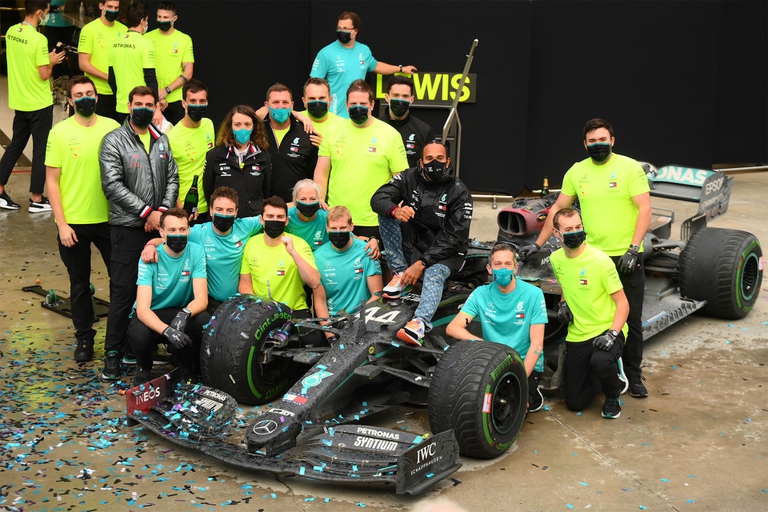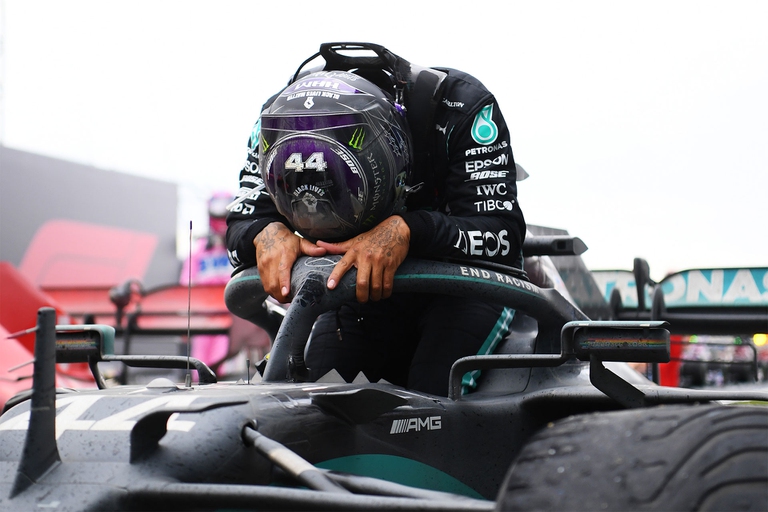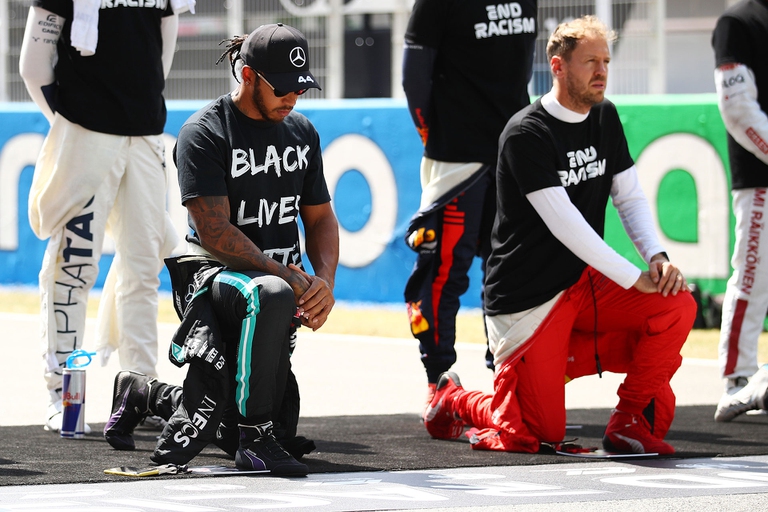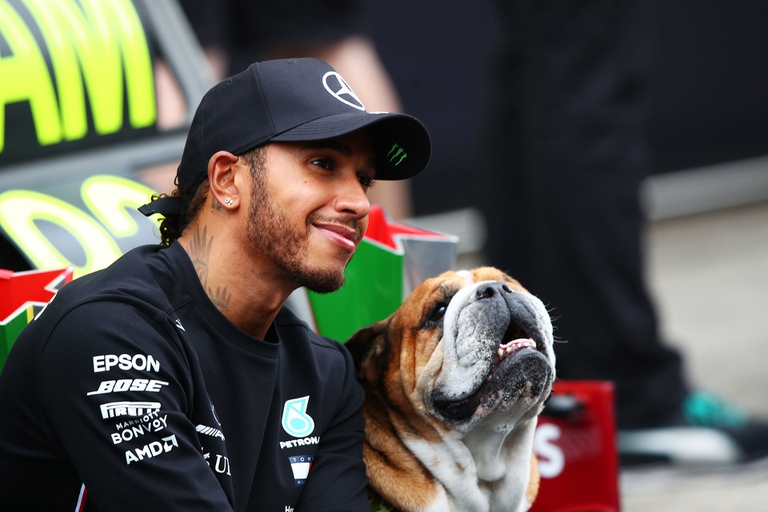
A new travelling exhibition, which is being shown in various parts of the Andean country Ecuador, seeks to make the important work of Ecuadorian women scientists visible. Because women need science and science needs women.
Lewis Hamilton, seven-time world champion and first-ever black Formula 1 driver, has devoted himself to human and animal rights, and the environment.
“This year I’ve been driven not just by my desire to win on the track, but by a desire to help push our sport, and our world to become more diverse and inclusive,” said Lewis Hamilton – one of the greatest drivers in Formula 1 history – on 15th November 2020, when he dominated the podium at the Turkey Grand Prix, securing his seventh world championship. “Equaling Michael Schumacher’s record puts a spotlight on me that I know won’t be there forever. So, while you’re here, paying attention, I want to ask everyone to do their part in helping to create a more equal world. Let’s be more accepting and kinder to each other. Let’s make it so that opportunity is not something that is dependent on background or skin colour. Nothing is impossible. A driving force for me this year has been to set an example for the next generation, to never give up on your dreams”. A powerful message that sums Lewis Hamilton up in just a few words. His love for racing, in fact, is matched by his commitment to the environment, human and animal rights, alongside a passion for veganism and sustainable fashion.
Hamilton was born in England in 1985. His father’s family is originally from the Central American state of Grenada, an island in the southeastern Caribbean Sea. His parents separated when he was only two years old, but he loved to spend time with his father, especially when they would go to Go-Kart tracks together. His father did everything he could to support his son’s passion. He kept four different jobs and stayed up at night for hours in the garage repairing old karts. It’s also thanks to him that, at the age of ten, Hamilton won his first national championship. This gave him the opportunity to meet McLaren founder and president Ron Dennis. The encounter changed his life: just two years later, he signed a contract with the British racing team and, from that point onwards, just kept winning. His Formula 1 debut took place in 2007. One year later, at the tender age of 23 years, Hamilton celebrated his first championship victory, with Ron Dennis as team leader.
He won six more World Championships in 2014, 2015, 2017, 2018 and 2020, together with the Mercedes team. Hamilton is also the driver with the most victories (94 out of 263 races), top-three finishes (163) and pole positions (97) in the history of the competition. When he started in 2007, Hamilton was the first black driver to ever race in the sport, and, as of 2020, remains the only one. Some claim Prince Bira was actually the first black driver, although he was originally from Thailand.
Hamilton has become a spokesperson for Black Lives Matter, the movement fighting for the civil rights of black people. Following the murders of Breonna Taylor and George Floyd at the hands of police in the United States, the driver has been seen multiple times wearing t-shirts with anti-racist messages. “One day I hope we’ll all be seen as equal,” said the world champion, who has also repeatedly taken a knee to honour the victims of police brutality. “It doesn’t matter if you stand or kneel, but we should be showing the world that F1 is united in its commitment to equality and inclusivity. F1 and the FIA need to do more. There is no quick fix for racial inequality, but it’s certainly something that we can’t just acknowledge once and then move on. We have to stay focused, keep highlighting the problem and hold those with the power accountable”. Although some believe that politics and sports shouldn’t mix, Hamilton has responded by pointing out that this issue is above politics – it’s about human rights. He wants to share positive, inclusive messages with Formula 1 fans, who belong to a wide variety of nationalities and cultures.
In October 2020, Hamilton also supported youth protests in Nigeria against SARS, a special department of the police accused of brutality, torture, abuse of power and human rights violations. Dozens of protesters were killed when the state violently repressed the demonstrations.
“We race Formula 1 cars. Our carbon footprint for sure is higher than the average homeowner who lives in the same city. But it doesn’t mean you should be afraid to speak out about things that can bring about a positive change”.
Hamilton has often been criticised, especially on social media, for what many define as “hypocrisy” because he claims to wants to protect the environment, despite the fact that his work and lifestyle are considered far from sustainable. “I still love racing and I want to continue with that,” he had said, candidly. The driver is making a real effort to be more sustainable in other respects: he’s vegan and has decided to eliminate plastic from his life, both at work and at home. When he can, he goes litter-picking on local beaches. He also sold his private jet and tries to fly less throughout the year, always offsetting emissions when he does. He only drives electric or hybrid Mercedes cars. His racing team has promised to become carbon neutral by the end of this year, while Formula 1 – which, as Lewis Hamilton himself reminds us, has changed a lot over time, with fuel use cut by two-thirds compared to previous years – aims to reach this target by 2030.
The driver, who has praised the work of young climate activists such as Greta Thunberg, Jamie Margolin and Alexandria Villaseñor, is also active in sustainable fashion. He’s worked with designer Tommy Hilfiger to design a green collection, rich in organic and recycled fabrics, vegan leather, and sustainable cotton. Hamilton’s fashion line is based on the idea of creating clothes for everyone, regardless of gender, age, build or ethnicity. This celebration of diversity finds its way in runways and fashion shows too.
The British driver loves animals: he’s been vegan since 2017, a decision he considers to be good for his health as well as the environment. Hamilton has also condemned intensive farming for its “cruelty” and has invested in a restaurant in London that serves plant-based dishes. The seven-time world champion also has a bulldog named Roscoe with almost 25,000 Instagram followers.
The International Organisation for Animal Protection (OIPA) congratulated Hamilton for his victory in Turkey, recalling some of the causes he supports; not only did he donate a million dollars to help kangaroos and koalas who were victims of wildfires in Australia, but has also launched an appeal to close bullfighting schools and put an end to this cruel sport.
“I’m always looking at things and how I can improve the effect that I’m having on the world. It’s something that I guess over time I’ve become more and more aware of. It takes a while. It’s not a quick-fix thing,” Hamilton explains, inviting everyone to try and make a difference before giving up and believing that all is lost. It’s true, he might not be a saint. But what if he were able to teach us all that we can still contribute to the protection of the planet? No matter who you are, where you come from, how much you earn, what your passions are. It doesn’t matter if you aren’t perfect. After all, nobody is. Even if you make mistakes, even if you need time, you’re what the world needs.
Siamo anche su WhatsApp. Segui il canale ufficiale LifeGate per restare aggiornata, aggiornato sulle ultime notizie e sulle nostre attività.
![]()
Quest'opera è distribuita con Licenza Creative Commons Attribuzione - Non commerciale - Non opere derivate 4.0 Internazionale.
A new travelling exhibition, which is being shown in various parts of the Andean country Ecuador, seeks to make the important work of Ecuadorian women scientists visible. Because women need science and science needs women.
Meet Gokul Subedi and Prakriti Mainali, the founders of two humanitarian organisations with one shared goal: to improve the lives of the most vulnerable and disadvantaged members of Nepalese society.
The Hijab ban has caused a major controversy in India after several Muslim girls were denied entry into a college for wearing the traditional headscarf.
Brazil’s Supreme Federal Court has indefinitely shelved a case that was set to drastically alter indigenous land right claims, leaving its fate uncertain.
Animal Equality reveals the brutality of Europe’s pig meat industry and illegal activities on farms for which many perpetrators haven’t yet been punished.
Jenu Kuruba, a honey-collecting indigenous tribe of India, accuses the local government of forcefully evicting them from the forest that is their home.
The state of women’s rights in Turkey is critical, and gender-based violence is increasing. The country’s withdrawal from the Istanbul Convention will only make matters worse.
One in three women have suffered physical or sexual violence. With contributions from Europe, Africa, Asia and Latin America, we look at how this shadow pandemic affects every corner of the world.
The Istanbul Convention against gender-based and domestic violence marks its tenth anniversary. We look at what it is, who its signatories are, and what the future might hold.











